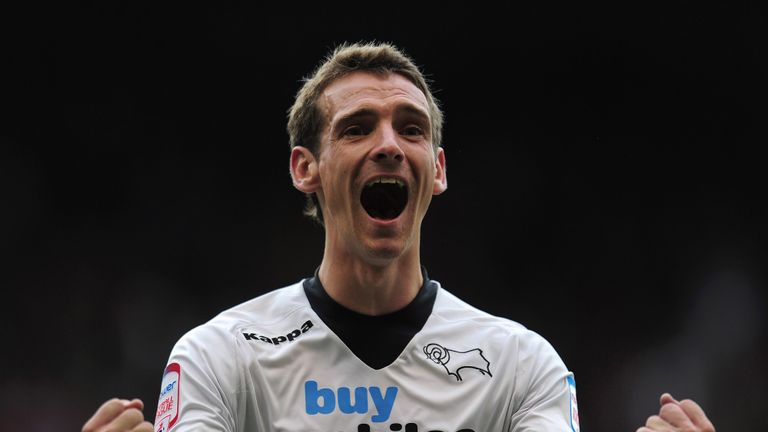“At Derby it is always about getting promotion. They’re a big club, a big club in the Championship. I believe it is a Premiership club. I’m just gutted I couldn’t achieve it and take them back to where they belong.”
When Craig Bryson speaks about Derby County, there are few who can challenge his point of view. That’s because there are few who have ever given so much to the club in modern history. He played under the guidance of eight different managers at one time or another, wore the shirt 275 times and is leading the rank for most Jack Stamps trophies. Yet for all this greatness and legendary status, there will always be an underlying sense of ‘what if’.
Bryson wasn’t part of Nigel Clough’s first couple of waves of low budget transfers. When considering Clough’s most recognisable and almost Clough-esque captures, Bryson actually arrived later than most. Jake Buxton and John Brayford were there already, Jamie Ward had just joined permanently after a successful loan spell. Jeff Hendrick and Will Hughes emerged through the academy, and Bryson only came in after the retirement of Robbie Savage.
But when reflecting on the time, he was the standout. A £300,000 capture from Kilmarnock where he had captained the side, by the time he would leave for a return to Scotland, Bryson’s appearance to pricetag ratio came at £1,107 per outing. By comparison, Ikechi Anya’s was £105,263.
“Bryson’s appearance to pricetag ratio was £1,107. Ikechi Anya’s was £105,263.”
“It was a real good and real easy squad to integrate into” Bryson remembers of his signing. “One of the main things Nigel does when he signs a player is to look into their background and look at their character. He then goes onto the football ability but for him, character is one of the main things you adhere to, you have to tick that box before he even considers signing you.”
Arriving almost in tandem with Chris Maguire, that character is pivotal to note. Bryson lasted under Clough because his attitude resonated with what Clough desperately wanted from a side he was still struggling to mould; Maguire didn’t.
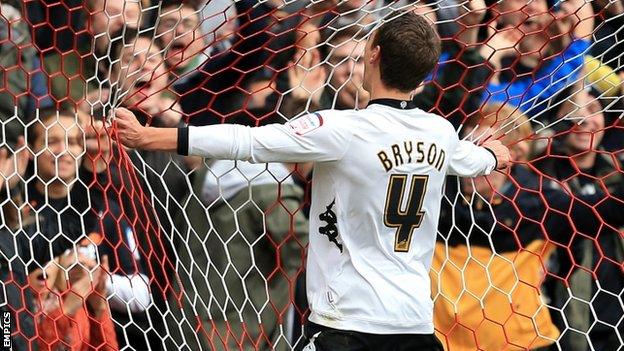
Bryson, who instantly took up a position in the centre of the park after a pre-season disrupted by injury, immediately made his presence felt, scoring a winner at Blackpool and beginning one of the best starts to a campaign in the history of the club. But it was here that Bryson would first encounter one of the abiding issues with the Clough days. Despite usually promising starts, there would almost be a regularity to the season. In 2010/11, Derby were pushing for the top two by November, and finished narrowly above the drop zone. This time around, they lost puff again.
And that was the main source of argument across the Derby County fanbase. For all the supporters who could see what Clough was trying to instil in his team, there was another half frustrated at what they saw to be underachievement. And that’s why, when Sam Rush took over as Chief Executive from Tom Glick, there was such confliction in the support when he opted to remove Clough from his position.
“Nigel did so much for me. I wanted to do well for him.”
“I was gutted to hear it. He did so much for me and helped me so much in the time he was there, so I wanted to do well for him. Bucko and that felt the same. Then you get prepared for the next game to digest and it was quite frustrating. Everybody liked the manager, everybody backed him and then it’s a decision out of your control and you have to get on with it. But I always kept in touch with him.”
Then came McClaren.
Under Steve McClaren, Bryson embarked on the finest goalscoring spell of his entire career, notching 16 goals as he was allowed more freedom off the back of Chris Martin. Where Martin was, the spritely legs of Bryson would be close behind, the two combining beautifully to bag close to 40 goals between them.
“My job basically was when Chris Martin got the ball at his feet, I had to be there” Bryson recalls. “It worked perfect. Fozzy would get the ball, I knew where Dawks or Johnny would be, I knew what movement he would make, I knew what movement Chrissy would make, I knew Eusty would be in the middle and I knew I could take off and go into the space.”
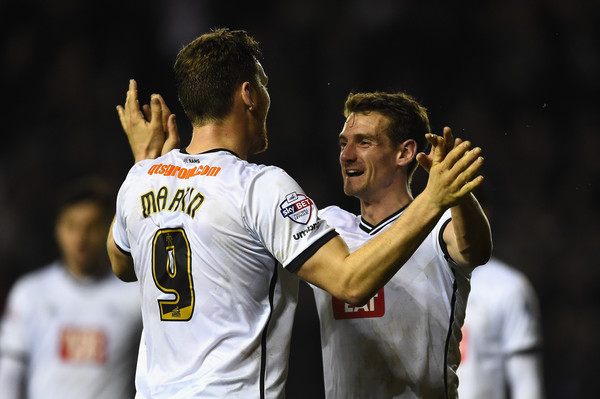
Over the course of the season, Bryson created history in a side that did the same. Before Clough had even been replaced, he’d ended a near 20-year wait for a league hat-trick when he scored three of five away at Millwall. Then a few months later came his second treble, this one perhaps just that little bit more memorable.
Now, Bryson had already scored against Forest. His winner from a couple of yards the season before had already etched him into cult hero status, but what he did on that day in March 2014 ensured his place in the hearts and minds of every person with an affinity to Derby County.
“It’s still the greatest day in my career.”
“Before I stepped up to take the penalty, I didn’t realise it was 100 and whatever years before anyone had done it and I didn’t realise we were gonna equal our biggest win. For me, it’s still the greatest day in my football career. It tops getting promoted.
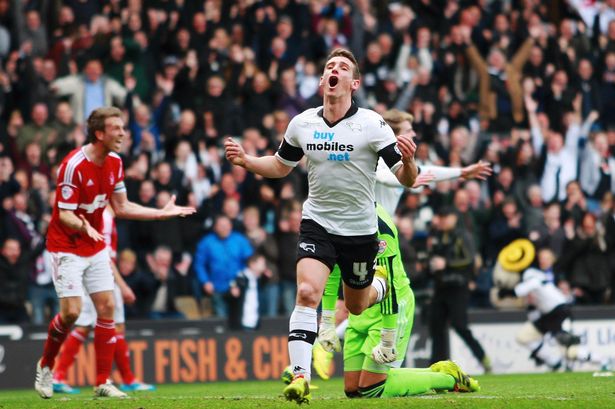
“It’s the only game people want to talk to me about and I’ll never forget it. For me to do that and give something back to Derby fans and Derby as a club, considering how much they’ve given me over the years, is amazing. Every time I see it on TV or whenever it pops up, it still gives me goosebumps. I don’t think I’ll ever get bored of watching it back.”
Bryson’s trio of strikes reignited a Derby side who at that point were threatening to fall apart. Having lost at Burnley in a top of the table six-pointer and without a goal in three matches since, even the most optimistic of supporters were fearful of a late season collapse. It wasn’t to come though – at least not that season, anyway.
But what was to come was heartbreak of a different kind, heartbreak of the cruellest kind. The decision to omit the Scot from the starting eleven at Wembley was long debated by the managerial team in the days before, but Bryson only found out he wouldn’t be playing on the morning of, a decision he himself remembers being ‘terrible’ due to the way McClaren went about it. And that’s how it proved looking back, as Bobby Zamora did that horrible thing on 90 minutes.
“I honestly don’t know what went wrong.”
Still, Derby were back. A free flowing, promotion worthy Derby were back. So, how Bryson never experienced the top flight with Derby County is an absolute mystery, one clouded in collapses, managerial turmoil and conflicting styles of play.
First came the monumental implosion of 2014/15, sparked by injuries to key players Chris Martin and John Eustace, and a mass panic over the future of McClaren. “I don’t think I played that Reading game (the final day 3-0 defeat) but we went 1-0 down quite early on, and we looked a bit nervous. The occasion and how we were on this bad run, it looked like we lacked confidence that we could actually turn it around. We finished what, 8th or 9th or something? I honestly don’t know what went wrong.
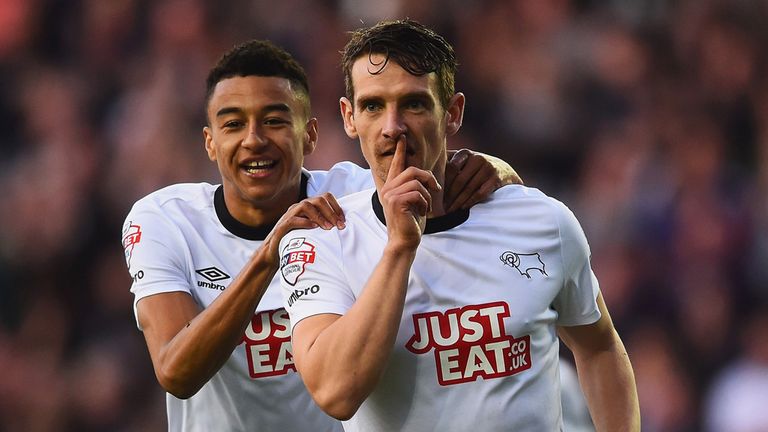
“We never really changed anything, we just went about doing what we do. For some reason we never picked up the results, never had that consistency and ultimately we failed to make it. That was a really, really disappointing end to that season.”
Next would come a familiar story, albeit one Bryson missed out heavily on after an opening day injury at Bolton Wanderers. Both Bryson and midfield accomplice Hughes sustained injuries that changed the immediate future of the club, as new boss Paul Clement blew £10 million on two new central midfielders. It was the summer of change and the summer Derby’s identity that was built under Clough disintegrated.
“When Nigel was signing players, Derby would be the best club they had been at. We’re then signing players who would maybe say Derby is a step down from clubs they’ve been at.”
It was a new look Derby, one built with the intention of achieving promotion by any means necessary.
It was a new look Derby, one built with the intention of achieving promotion by any means necessary. But they didn’t. Clement couldn’t do it, Wassall neither. Then there was Nigel Pearson’s disastrous tenure, another stint of McClaren ball and ultimately, Gary Rowett, resulting in his decision to leave for a season to Cardiff.
“I was the only player that had a bit of interest. Without telling me he wanted me to go, I felt that he was telling me and asking if I would go. It came about from that so I could either sit there and not play because there was no guarantee, and Cardiff were in for me so it was like, ‘okay I’ll go’. From a personal point of view it was great to go and get promoted but I never ever wanted to leave Derby. I always wanted to fight for my place but it was either you get the chance to play at Cardiff or sit on the bench at Derby and I felt the manager wanted me to go.”
“I never wanted to leave Derby.”
Inevitably, Bryson – in his one season away from Derby in English football – went on to achieve that illustrious promotion he craved. It was at this moment he had a choice to make. Did he want to try his hand in the Premier League with a Cardiff side who wanted him permanently, or did he want to try and achieve it with the club he adored? Rowett’s departure and the incoming Frank Lampard meant he chose the latter.
And Bryson would have his part to play once again. Under Lampard, Bryson appeared 32 times in all competitions, but his Derby County life wouldn’t end how he’d hoped. Forced off injured in the final weeks, he couldn’t go out on his own terms and instead was forced into those closing matches as merely a spectator. At Elland Road, he wasn’t even there. At least not in body, anyway.
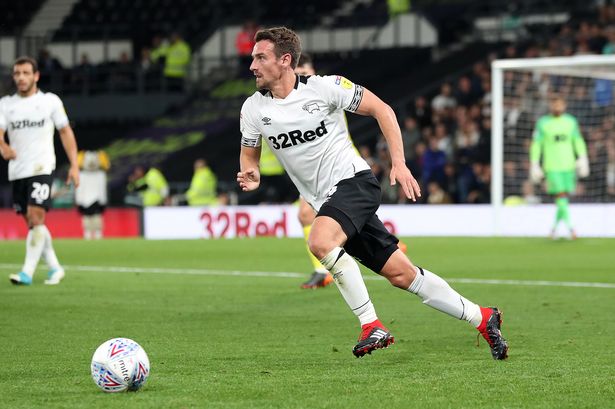
“My son was born the day before that second leg” he beams. “But that night I was just jumping up in my living room and even my wife was getting a bit excited at that and she’s not that interested in football! But she was getting caught up in spygate and what was happening and she knew how much it meant to me and how much I wanted to win and how much I wanted to get promoted. We were trying not to wake my son up and stuff, but it was excellent. I did wish I was there though.”
He was at Wembley however, spending one final weekend with Rams supporters, where he would be mobbed in an array of London bars and forced to drink an almost embarrassing amount of Jagermeister. And don’t mention this too loud, but he’s not even a fan of the stuff. Still, the fact he’d do shot after shot of it is testament to what the Derby County fans mean to him.
Finally, it all culminated in more heartache. And it saw the side ripped apart. Loanees left, Bryson finally returned to Scotland after eight years under Derby employment and Lampard’s protracted move to Chelsea was finalised.
“If I could leave anywhere, it would be to Derby. Lampard would go to Chelsea.”
“Would Lampard have stayed?” Bryson asks himself. “I think as soon as the Chelsea job came up he always would have went because the way he feels about Chelsea is the same kind of way I feel about Derby. If I could leave anywhere, it would be to Derby and he’d go to Chelsea.”
And that’s because for Craig Bryson, Derby is his club. It wasn’t always easy and truth be told, he took his fair share of stick from a fanbase who desperately wanted to finally escape the clutches of the Championship. But there are little players in recent history like Bryson when it came to determination, fight and pure love for that little ram on the shirt.
“Derby means everything to me. I’m looking forward to the days I can just come back as a fan and experience an East Midlands derby in the crowd, do the things that a fan does. And I hope the club knows that if ever they need me, I’m absolutely here for them. I love the club.”

Bryson was speaking as part of Pride: The Inside Story of Derby County in the 21st Century. Now available at the DCFC Megastore and online. Pride is also available from late October at all book retailers and on Amazon.
